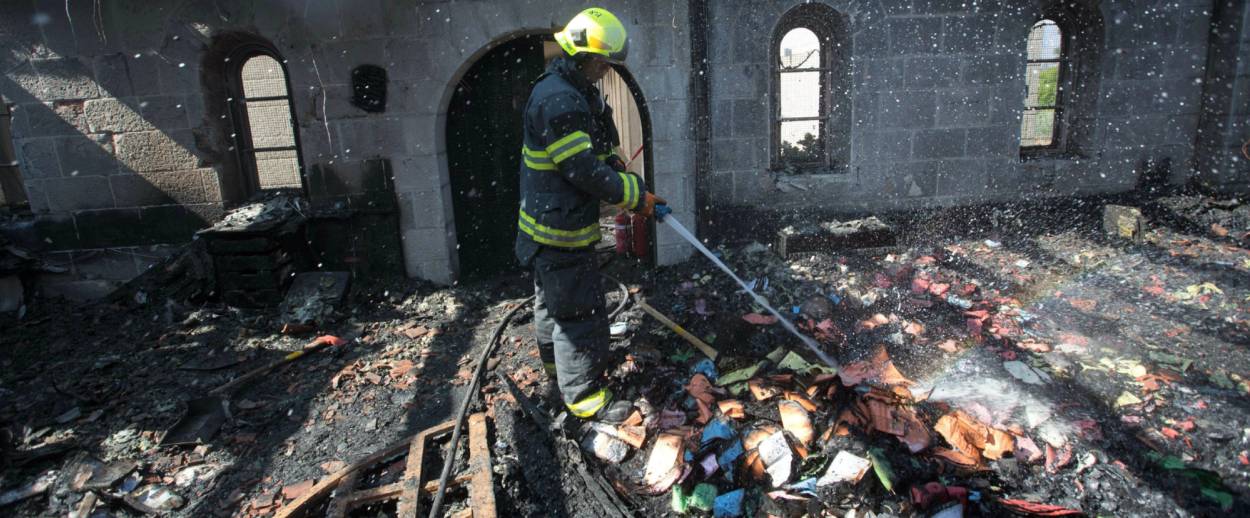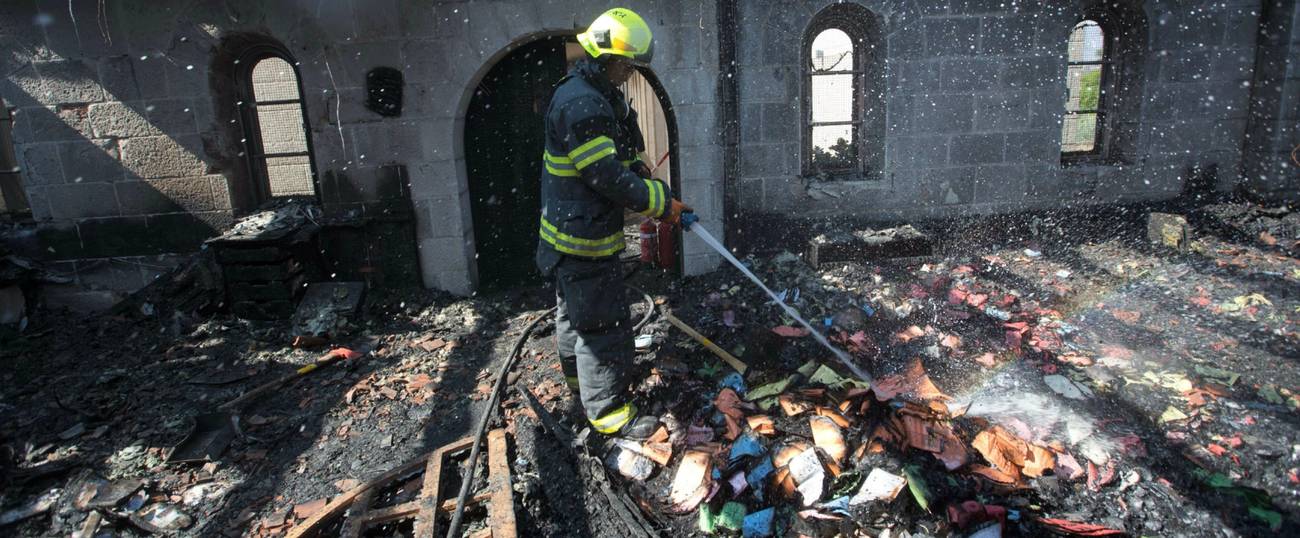Arson Attack Strikes Israel’s Church of the Multiplication
Sixteen Jewish extremists—Yeshiva students on a visit to the Sea of Galilee—have been detained




A church built upon the spot Jesus is said to have miraculously fed a crowd of 5,000 people was ravaged by flames today in a case of suspected arson. The fire broke out in the revered Catholic Church of the Multiplication of Loaves and Fish within Tabgha, an area just off the Northwestern shore of the sea of Galilee, late last night. The local fire-brigade’s preliminary investigation revealed that the blaze began in several parts of the church, indicating that the fire was no accident. Footage from the scene of the crime show piles of charred pages from old prayer books, smoldering rubble, and red Hebrew graffiti on one of the church’s limestone walls, declaring “false idols will be smashed.”
Haaretz reported that 16 Yeshiva students were arrested this morning on the suspicion they committed the hate crime. The students are reportedly residents of the West Bank who had spent the night in the area. According to the New York Times, several of the group belonged to a Jewish seminary in Yitzhar, a settlement with a reputation for radicalism. Soon, however, all of the 16 students were released because there wasn’t sufficient enough evidence to convict them.
Netanyahu has since ordered Israel’s Shin Bet security service to perform an “accelerated investigation into the incident.”
“The shocking torching of a church is an attack on all of us,” he said. “Freedom of worship in Israel is one of the foundation stones of our values and is protected by law. We will exercise the full weight of the law with those responsible for this criminal act. Hate and intolerance have no place in our society.
The Church of the Multiplication of Loaves and Fish itself is fairly new, made in the 1980s, however, it was built upon the remains of a Byzantine Church constructed in the 5th century, the Sun Herald reported. The church attracts more than 5,000 visitors and pilgrims a day who come to admire and pay respects to the preserved Byzantine mosaic floor, which fortunately wasn’t damaged by the flames. Nonetheless, Haaretz reported that it wasn’t until 3:50 on Thursday morning that the fire was finally extinguished. The video footage shows firemen examining the Church’s soot covered walls, smashed windows and collapsed doors.
The Jerusalem Post reported that Wadia Abu Nasser, the Catholic Church’s senior advisor in Israel, expressed his anger, not only because “the damage is in the millions,” but also because these sorts of religious hate crimes continue to happen frequently within the Jewish state.
“There have been dozens of attacks against holy places in Israel,” Nasser said. “This is more than just one person. There is hatred of the other here and a lack of respect.”
If the fire was indeed caused by right-wing extremist Jews, the torching of the Church of the Multiplication can be seen as the most recent example of a “price tag” attack: acts of vandalism or violence against the property and homes of non-Jews justified on the basis that the damage is the “cost” of Palestinian and Israeli government opposition to settler interests. The bigotry inherent to price tag activity has frequently made non-Jewish places of worship targets for the attacks. Last October, a West Bank mosque within a Palestinian village near the city of Nablus was torched and graffitied in a way comparable to today’s torching of The Church of the Multiplication.
The attacks are always universally denounced by Israel’s Jewish community. Today, Haaretz reported that Chief Sephardic Rabbi Yitzhak Yosef announced: “The deviant behavior of church arsonists in the north must be condemned absolutely, and they should be punished severely.” However, victims often feel frustrated because while arrests are made, convictions are rarely completed. The New York Times explains why, reporting that Israeli security officials “have difficulty amassing evidence that will hold up in court because the suspects they interrogate rarely talk and because the crimes often require little more than a screwdriver, some gasoline or a can of spray paint.”
Previous: How Israel Reacted to a Racist Attach on a Jewish-Arab School
Radical Rabbi Arrested in Mosque Arson
Jas Chana is a former intern at Tablet.